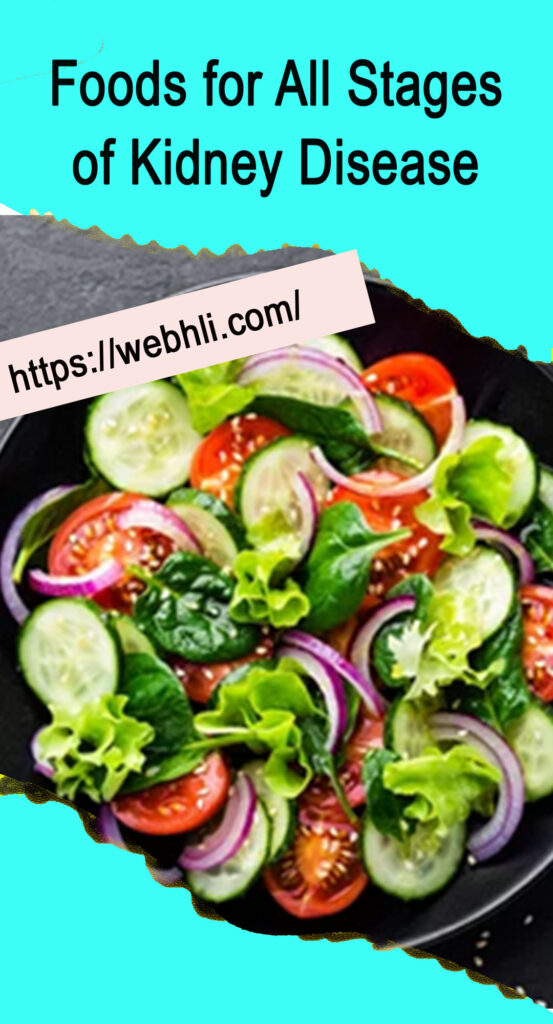
Kidney disease, also known as chronic kidney disease (CKD), affects millions of people worldwide. Proper nutrition is crucial in managing CKD and slowing its progression. Dietary needs can vary significantly depending on the stage of kidney disease. Here's a guide to foods that are beneficial for each stage of CKD, along with general dietary recommendations.
Check out these related articles, too:
Common Signs of Kidney Failure
Foods to Keep Your Kidneys Healthy- A Guide to Renal-Friendly Nutrition
What Juices are Good for Kidney Disease
Early Stages (Stages 1 and 2)
In the early stages of CKD, the focus is on maintaining overall health and controlling conditions that can exacerbate kidney disease, such as diabetes and hypertension.
Recommended Foods:
- Fruits and Vegetables: Apples, berries, grapes, cauliflower, bell peppers, and onions.
- Whole Grains: Brown rice, quinoa, whole wheat bread, and oats.
- Lean Proteins: Chicken, turkey, fish, eggs, and tofu.
- Healthy Fats: Olive oil, avocados, and nuts (in moderation).
Dietary Tips:
- Monitor Protein Intake: Moderate protein intake to avoid overloading the kidneys while ensuring sufficient nutrients.
- Control Blood Pressure: Reduce sodium intake by avoiding processed foods and choosing fresh, whole foods.
- Stay Hydrated: Drink adequate water but avoid excessive fluid intake to prevent strain on the kidneys.
Middle Stages (Stages 3 and 4)
In these stages, kidney function is significantly reduced. It’s important to limit the intake of certain nutrients to prevent further damage.
Recommended Foods:
- Low-Potassium Fruits and Vegetables: Apples, berries, cherries, cabbage, cauliflower, and green beans.
- Lower-Protein Options: Smaller portions of lean meats, fish, eggs, and plant-based proteins.
- Low-Phosphorus Foods: White bread, white rice, and pasta.
- Healthy Fats: Olive oil and canola oil.
Dietary Tips:
- Limit Potassium and Phosphorus: Monitor and limit intake of high-potassium and high-phosphorus foods such as bananas, oranges, potatoes, dairy products, nuts, and legumes.
- Monitor Protein Intake: Continue to manage protein intake, focusing on high-quality protein sources.
- Reduce Sodium: Further reduce sodium to control blood pressure and reduce fluid retention.
Late Stages (Stage 5 or End-Stage Renal Disease)
In the final stage of CKD, dialysis or a kidney transplant is often necessary. Nutritional needs are more specific and require careful monitoring.
Recommended Foods:
- Low-Potassium Fruits and Vegetables: Berries, apples, cherries, and lettuce.
- Controlled-Protein Foods: Exact protein needs depend on whether the patient is on dialysis. Include small portions of high-quality proteins such as eggs, fish, and poultry.
- Low-Sodium Choices: Fresh foods without added salt.
- Low-Phosphorus Options: White bread, unenriched pasta, and rice.
Dietary Tips:
- Work with a Dietitian: Regularly consult a renal dietitian to tailor your diet to your specific needs and dialysis requirements.
- Strictly Limit Potassium and Phosphorus: Avoid high-potassium foods (like potatoes, tomatoes, and oranges) and high-phosphorus foods (such as dairy, nuts, and seeds).
- Manage Fluid Intake: Control fluid intake to prevent overload, which is crucial for those on dialysis.
General Dietary Recommendations for All Stages
Regardless of the stage of kidney disease, certain dietary practices can help manage the condition and improve overall health.
- Eat Fresh, Whole Foods: Minimize processed foods that are high in sodium, potassium, and phosphorus.
- Balance Nutrients: Ensure a balanced intake of carbohydrates, fats, and proteins according to individual dietary plans.
- Stay Hydrated: Maintain proper hydration, adjusting fluid intake based on medical advice.
- Control Blood Sugar and Blood Pressure: Keep these parameters in check through diet and medication, as they significantly impact kidney health.
Conclusion
Managing kidney disease through diet is essential at every stage. While nutritional needs vary depending on the severity of the disease, focusing on a diet rich in fresh, whole foods and low in sodium, potassium, and phosphorus can help slow disease progression and improve quality of life. Regular consultation with healthcare providers and dietitians is vital to ensure dietary choices align with individual health needs and conditions.


 Protected by Patchstack
Protected by Patchstack